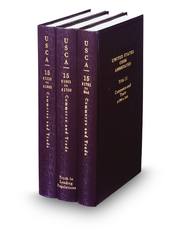
Unlike the official USC or free, unofficial versions of the USC online, annotated codes provide references to primary and secondary sources and cross-references to relevant statutes and regulations. There are two commercially published, unofficial codes:
The USCA also includes references to another West publication, US Code Congressional and Administrative News (USSCAN), which is primarily a resource for selective legislative history materials related to the enactment of a particular section of the Code.
 |
 |
Bloomberg Law also provides an online only, annotated version of the USC.
Generally the time to check annotated codes is after first searching a free online version of the USC (from LII or ORLC), which should have given you a better handle on what statutes are at issue for your question. Since the annotations differ between the USCS and USCA, ideally one should check both, whether it is in print or online or some combination of the two.
The USCS is from Lexis and is available in print and online exclusively through Lexis. The USCA is a West product, available in print and online only through Westlaw.
If you do not already have the title and section number of the statutes you need, then there are four main finding methods:
On Lexis Advance, for a reminder of how to do terms and connectors searching, click "More" in the upper right of the screen, select "Help" from the drop down menu, and then click "Using Search Connectors."
On Westlaw, click advanced search for a reminder of its search operators. There is also a PDF available laying out how Westlaw designates the different fields of a statute if you wish to search individual components, or some combination of them. (Unfortunately, one has to run a search to be reminded of the abbreviations for each field. But this can be worth doing if, say, you want to search unannotated versions of a code, which would turn into a search like this: pr,ca,ci,te(keyword).)
Once you have found the citation to a statute that you want to research, review the annotations following the statutory text in both USCS and USCA.
Currency
In print, annotated codes are updated annually with pocket parts or bound supplements. The USCS also frequently issues supplements that contain newly-enacted session laws, which may not yet have been integrated into an official published version of the Code. (In contrast, West publishes new laws in USCCAN.) Online, when there is new legislation, Lexis and Westlaw make updates more quickly, but not as quickly as OLRC.
Citators from Lexis and Westlaw Are Online Only
Shepard’s in Lexis and KeyCite in Westlaw can be used to determine whether a statute is still valid and to find additional cases and other materials that analyze or interpret the statutory language beyond the annotations.
Note that the USCS will only contain references to treatises published by Lexis, while the USCA only contains references to treatises published by West. The USCA often provides a higher number of annotations to cases for a given statute; however, the USCS is more selective and may provide a longer annotation if the case is particularly relevant. Also, only the USCS provides citations to relevant administrative law decisions from courts and agencies.
In terms of print versus online, print versions of the USCA and USCS are worth using as the index is easier to use online and can force a researcher to consider the USC's organization and the terms of art that may be used. One must go online, however, to double check that a statute is still good law, using Lexis' Shepard's and/or Westlaw's KeyCite. Online searching also offers the unique features of terms and connectors and natural language searching.
